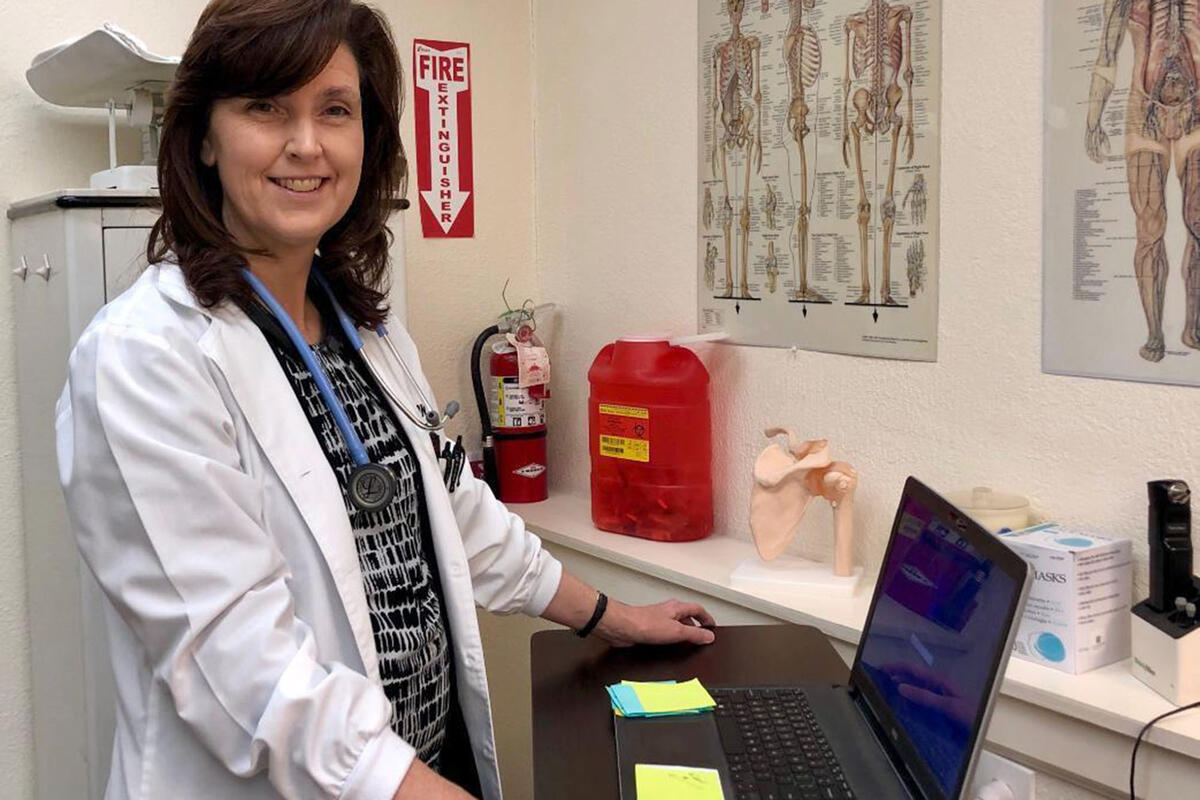In 2009, UNLV Nursing alumna Marie Peterson moved from Las Vegas to Tonopah, Nevada, trading big city lights for big starry nights. Tonopah, located halfway between Las Vegas and Reno, has a population of just 2,607.
Peterson knew it was going to be an adjustment working in a small town; she didn’t know she’d eventually be the only nurse practitioner in town.
The nearest emergency room is about 90 miles way, either to Hawthorne, Nevada, or Bishop, California. Peterson and the staff at Tonopah Primary Care help fill those frontier medicine gaps with quality service and spotlights the important role of nurse practitioners to Nevada’s communities.
Passing the Baton from Peterson to Peterson
Peterson started her nursing career in Las Vegas, working as a registered nurse for 18 years. When she moved to Tonopah, she became director of nursing of a three-bed emergency room in the town hospital. She began taking family nurse practitioner courses at UNLV and graduated with her nursing master’s degree in 2017.
During her clinicals in Tonopah, she worked with a doctor of osteopathy, Dr. Gerald Peterson (no relation), who planned to retire from his primary care practice. With limited services in the area and an inability to bring in permanent providers, Marie Peterson felt she could step up and take over his practice.
Originally, the physician was going to semi-retire and consult, but two months into this arrangement, a health issue forced him into complete retirement, leaving Peterson with more responsibilities than she expected. However, Peterson was already aware of rural healthcare challenges from her ER experience. She also credits her predecessor for leaving a strong office manager to help transition, not to mention mentors from UNLV to reach out to for support.
The Nurse Practitioner Role
Being a nurse practitioner gives Peterson an advantage in a small town in that she can do more for patients than a registered nurse. NPs can work in primary care, acute care, and specialty services. Their advanced degree gives them authorization to diagnose illnesses, treat conditions, and provide evidence-based healthcare. Peterson also says being a nurse practitioner allows her to make a difference without having to wait for a physician to help.
But even with an expanded skillset, Peterson always remembers her scope of practice. “I think just like being an RN, you need to follow your gut to recognize when something's above your level of care,” she explains.
Rising to the Challenges of Small-Town Life
One issue from working as a single nurse practitioner in Tonopah is not consistently having other providers in the area to take on some of the workload.
“(It’s) good for practice, good for business, but when you're one nurse practitioner, not that we don't do our best, but it can be challenging to keep up with the needs of 3,000 people,” Peterson says.
That population number doesn’t include travelers from smaller surrounding towns, like Round Mountain and Fish Lake. “There are a lot of small areas that might have a population of 20 people or 200 people, but they travel in because their next resource is another one and a half hours, two hours away,” Peterson says. “If you go to the big cities, you're looking at three hours.”
She adds, “This is the center of the middle of nowhere, the center where people will come in if we have the resource.”
Despite a smaller population, Tonopah healthcare still had to adjust like everyone else during the coronavirus pandemic. Peterson put infection controls in place, including PPE for her staff; hand-washing education; and social distancing. It took time to get adequate supplies, and they didn’t have testing centers at the beginning.
But Peterson says her community made it easier by embracing the changes in order to avoid getting sick. “I feel like the town was understanding,” she says, “and people had that home spirit of taking care of each other.”
Moving from an urban area like Las Vegas to frontier Tonopah takes commitment both professionally and personally. “It's not for the weak. It's for the brave,” Peterson says. “If you're looking for an easy paycheck, it’s not going to [work].”
She describes Tonopah as rustic and rural, with clear skies for stargazing, small convenience stores and shops, and no stoplights, just stop signs. Peterson compares the town to the classic TV show “Cheers”, saying, “They either know your name is a good thing or they know your name is not a good thing, so you better do a good job.”
After more than a decade in Tonopah, Peterson knows her patients trust her. “As my office manager likes to say, ‘You have skin in the game, you are part of community. You are a partaker of the services, and you're also a provider of it.’ If you have skin in the game, you're going to go the extra mile versus a traveling provider that comes in from outside. They may have heart in the healthcare world, but people, especially native to the area, are perceptive if you care or you're just there for a paycheck.”
Keeping Her Word
Looking forward, Peterson has no plans to move again, saying she enjoys the quiet community lifestyle. But she also keeps her promises.
“I gave Dr. Peterson my word I would take care of this small town,” she says. Eventually, Peterson will choose a successor, but she’s not ready to step down. “I'm looking forward to getting my doctorate,” she says, “but I need to figure out how to make that work around what I'm doing. I can't let my community down.”



